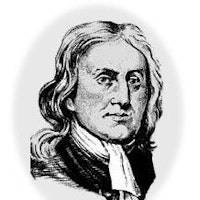Though God be everywhere present, yet He is only present to thee in the deepest and most central part of thy soul…
Though God be everywhere present, yet He is only present to thee in the deepest and most central part of thy soul…
William Law

The Deepest Part of Thy Soul
Topic: Immanence & Transcendence
Though God be everywhere present, yet He is only present to thee in the deepest and most central part of thy soul.
Thy natural senses cannot possess God or unite thee to Him; nay, thy inward faculties of understanding, will, and memory can only reach after God, but cannot be the place of His habitation in thee.
But there is a root or depth in thee from whence all these faculties come forth, as lines from a center or as branches from the body of a tree.
This depth is called the Center, the Fund or Bottom of the soul.
This depth is the unity, the eternity, I had almost said the infinity of thy soul; for it is so infinite that nothing can satisfy it or give it any rest but the infinity of God.
William Law was born in 1686 in King’s Cliffe, Northamptonshire, England, the son of a grocer, Thomas Law. He entered Emmanuel College, Cambridge in 1705 as a sizar, studying the classics, Hebrew, philosophy, and mathematics. In 1711, he was elected a fellow of the college and ordained as a priest in the Church of England. His academic career came to an end in 1714, when he refused to swear the oath of allegiance to King George I, remaining loyal to the exiled House of Stuart. This decision cost him his fellowship and marked him as a “non-juror,” part of a group of clergy who prioritized conscience over conformity.
In the years following, William Law served briefly as a curate in London and then became private tutor and spiritual director to the Gibbon family in Putney. He lived for more than a decade in their household, guiding not only the family but also a wider circle of spiritually minded individuals, including John and Charles Wesley, the poet John Byrom, and the physician George Cheyne. During this time, William Law wrote extensively. His 1729 work, A Serious Call to a Devout and Holy Life, became one of his most influential texts, offering a vision of disciplined, inward Christian life that deeply affected readers including William Wilberforce and later Evangelical leaders.
By 1740, William Law had returned to his birthplace in King’s Cliffe, where he lived for the rest of his life with Elizabeth Hutcheson and Hester Gibbon. Their household was shaped by devotion, simplicity, and charitable service. Law continued to write, turning increasingly toward a Christian mystical theology that emphasized inner transformation and participation in the divine life. He died on 9 April 1761. His writings—marked by clarity, conviction, and spiritual depth—continue to invite readers to seek the divine not through speculation or belief alone, but through inner surrender and a life shaped by love.
The Spirit of Thy Prayer
Law, William. "The Spirit of Prayer, Part 1." Printed for M. Richardson, London, 1749, p. 28.

William Law
Theme: Intimate Divinity

About This William Law Quotation [Commentary]
Additional William Law Quotes
Related Quotes
Copyright © 2017 – 2026 LuminaryQuotes.com About Us